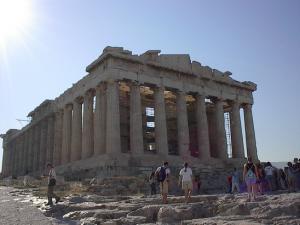T he American Declaration of Independence is wise when it appeals both to the truths of nature and nature’s God. Without a divine vision the people perish and without being able to count the cost, our grasp on the divine vision can fail through human folly, bad choices, and weakness. We need to know what should be, but also what is and can be. Too much vision and a nation cannot act, but too little and it cannot act well. The Founding Fathers of our nation were blessed to stand at the end of a long tradition which took both religion and reason seriously.
he American Declaration of Independence is wise when it appeals both to the truths of nature and nature’s God. Without a divine vision the people perish and without being able to count the cost, our grasp on the divine vision can fail through human folly, bad choices, and weakness. We need to know what should be, but also what is and can be. Too much vision and a nation cannot act, but too little and it cannot act well. The Founding Fathers of our nation were blessed to stand at the end of a long tradition which took both religion and reason seriously.
Today the United States faces two dysfunctional nations that are tyrannical as a result of forgetting this balance. One, atheistic China, is hostile to religious faith and the other, Iran, is hostile to modernity. Perversely, China, despite publicly lauding science and reason continues decades of genocidal behavior while Iranian theocrats are wrecking the noble Persian culture. China has stepped up the public persecution and murder of religious minorities in the name of state atheism while the atrocities of the Iranian regime against reason in the name of theism rightly infuriate all good people.
It is no surprise that both nations are tyrannical because both refuse to acknowledge an important path to human enlightenment. China will not acknowledge the morality and the law of God and Iran will not submit to the sweet moderation of reason in pursuing a vision of the godly life.
Christians know the need for balance all too well from our own history.
The Christian experience shows the importance of both reason and revelation to a good life and humane civilization. Philosophy and religion combined produced the glories of the Renaissance and the wonders of constitutional government. This fusion of the wisdom of Athens and the revelation of Jerusalem can be seen in the glorious architecture of Christian Florence and in Dante’s divine poetry. It can be seen in the writings of John Locke who wrote Christian apologetics and produced many of the philosophical underpinnings for our government.
 Of course, when Christians from Jerusalem met philosophers from Athens, they were not always wise enough to follow the examples of Saint Paul, Saint Basil, and Saint Augustine and utilize the wisdom found in classical thinkers and poetry. When Jerusalem forgot Athens, Christianity was perfectly capable of turning love of God into the fires of persecution, tyranny, and irrationality. Passionate faith without calming reason is too hot blooded to be trusted with power.
Of course, when Christians from Jerusalem met philosophers from Athens, they were not always wise enough to follow the examples of Saint Paul, Saint Basil, and Saint Augustine and utilize the wisdom found in classical thinkers and poetry. When Jerusalem forgot Athens, Christianity was perfectly capable of turning love of God into the fires of persecution, tyranny, and irrationality. Passionate faith without calming reason is too hot blooded to be trusted with power.
The reaction of some in Christian lands seeking safety from pure secularism was understandable, but wrong headed. The millions who died in the twentieth century under secular regimes proved that Athens without Jerusalem is coldly cruel. The Soviet psychiatric wards where thousands were tortured and killed by calm and reasonable sounding men were no improvement on the stake. Humankind, it turns out, does not live on bread alone. Cold and sterile reason without revelation is too inhuman to be trusted with power and too sterile to long keep it.
Iran and North Korea will have to draw on their own traditions, find their own path to their own equivalents to Athens and Jerusalem, or they will perish as nations. Their pain should be a warning to Americans who take for granted the blend of religious fervor and hardheaded skepticism that has always been part of our tradition. Balancing the two is always hard and zealots are always trying to erase either the influence of Athens or Jerusalem on American life, but we are a nation whose very architecture in our national buildings, patriotic songs, and founding documents proclaims Washington a child of the marriage between Athens and Jerusalem.
Religion without the stability provided by reason is toxic, but so is reason without the information that only God can provide. Both the nation and many of us as individuals veer between sirens calling for irrational religiosity or God-blind secularism. I wrote When Athens Met Jerusalem to try to understand for myself the peculiarly powerful blend of reasonable faith and mystical skepticism that came out of the fusion of Athens and Jerusalem. Though it is a small contribution, I hope it is part of a great conversation of how we can avoid loss of faith and loss of wisdom.
Let’s go back to the best of this fusion, repent for our sins, and take up the project again with hope!











